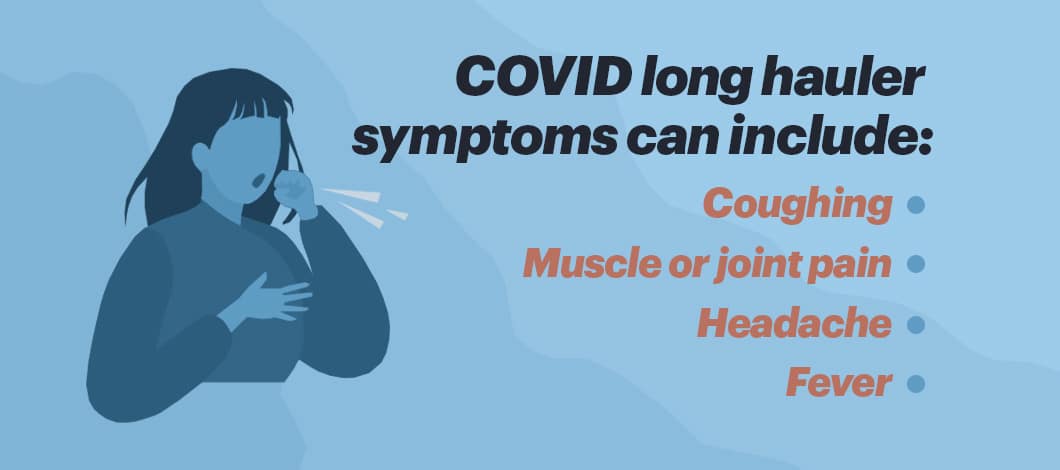How are COVID-19 long haulers covered under the Americans with Disabilities Act (ADA)? Protections may apply to workers with long-term effects from COVID, according to the latest regulatory guidance. This places a responsibility on employers to consider ADA compliance when dealing with workers who are experiencing challenges related to COVID.
Let’s look at how the ADA applies to employees who have long-term effects from the coronavirus.
First, we’ll review how general ADA COVID guidelines apply to employees experiencing COVID struggles. Then we’ll focus on who qualifies as a COVID long-hauler. Finally, we’ll break down how ADA general guidelines specifically apply to employees with long-haul COVID disability claims.
The ADA and COVID-19
The ADA, administered by the U.S. Equal Employment Opportunity Commission (EEOC), prohibits workplace discrimination against employees with disabilities.
EEO compliance obligations apply to private employers with 15 or more employees, employment agencies, labor organizations and joint labor-management committees. It works in tandem with the Rehabilitation Act, which applies similar regulations to federal agencies and contractors.
Types of discrimination covered by the ADA include discriminatory hiring and firing policies as well as treatment of workers on the job. Employers must make reasonable accommodations to job applicants and employees with disabilities, such as making a work area wheelchair-accessible by installing a ramp.
An exception is when such accommodations would cause the employer undue hardship, such as an expensive accommodation that would place excessive strain on an employer’s cash flow.
ADA COVID Guidelines
The EEOC has released some general ADA COVID guidelines for employers. These cover a number of general areas:
- Disability-related inquiries and medical exams: What restrictions apply to questions employers may ask employees about medical conditions related to COVID?
- Confidentiality of medical information: What confidentiality obligations apply to employers requesting medical information related to COVID, and what exceptions apply?
- Hiring and onboarding: When are disability-related inquiries and medical exams prohibited and allowed during the hiring and onboarding process?
- Reasonable accommodations: What accommodations are employers required to make for applicants and employees with COVID symptoms or conditions?
- Harassment based on national origin, race or other protected characteristics: What must employers do to prevent harassment of employees related to COVID?
- Furloughs and layoffs: How should employers handle furloughs and layoffs during the pandemic?
- Return to work: What ADA regulations apply as employees return to work?
- Age: How do ADA age discrimination protections apply to employees 65 and older who are at high risk from COVID?
- Caregivers and family responsibilities: How do ADA sex discrimination considerations apply to employees who must care for school children during the pandemic?
- Pregnancy: Can employers exclude workers involuntarily from the workplace because of pregnancy during the pandemic?
- Vaccinations: How do ADA protections apply to employers requiring vaccinations to come to work or employees who request vaccine exemptions?
These guidelines encompass a wide range of issues broader than COVID long haulers. Here we’ll focus on how they apply to employees experiencing long-term effects from COVID. For details on other topics, see the EEOC’s full guidelines and related links.

Who Are COVID Long Haulers?
Summarizing the policies of the Department of Health and Human Services (HHS) and the Department of Justice, which are informed by the Centers of Disease Control and Prevention (CDC), the HHS defines COVID long-haulers as those suffering from a condition called “long COVID.”
This condition is characterized by experiencing symptoms that last months after first becoming infected or symptoms that recur or emerge at a later time.
Common symptoms may include:
- Fatigue
- Difficulty concentrating (“brain fog”)
- Difficulty breathing, such as shortness of breath
- Dizziness when standing
- Rapid heartbeat (palpitations)
- Chest pain
- Cough
- Muscle or joint pain
- Headache
- Fever
- Loss of smell or taste
- Anxiety or depression
Other symptoms are possible. Some people experience damage to multiple organs.
Impairments
These symptoms may qualify as a disability under the ADA if they substantially limit one or more major life activities. This can involve a physical impairment affecting one or more body systems, such as lung damage, or a mental impairment, such as mental or emotional illness. Such impairments can limit life activities such as:
- Breathing
- Sleeping
- Standing
- Walking
- Sitting
- Lifting
- Bending
- Performing manual tasks
- Caring for oneself
- Concentrating
- Reading
- Working
Whether limitations on such life activities constitute substantial limitations is interpreted broadly under federal guidelines. The impairment doesn’t need to prevent or significantly restrict an individual from performing a life activity and the limitations don’t need to be severe, long-term or permanent. Even if the impairment comes and goes intermittently, it still may substantially limit the individual when active. Determination of substantial impairment should be made without the benefit of any medication or treatment to compensate for symptoms.
Individuals who suffer from a long COVID impairment that counts as a disability are entitled to all protections afforded by the ADA. Long COVID doesn’t count as a disability in all cases. Substantial impairment of life activities should be determined on an individual case basis.

How Does the ADA Apply to COVID Long Haulers?
The general ADA protections outlined above can be applied to COVID long haulers in a number of areas.
These include:
- Disability-related inquiries and medical exams
- Confidentiality of medical information
- Hiring and onboarding procedures
- Reasonable accommodations
- Returning to work
- Vaccination policies
The following summary of how the ADA applies to these areas reflects the EEOC’s general guidelines. The EEOC notes its jurisdiction is limited to applying antidiscrimination laws and doesn’t extend to areas involving the jurisdiction of federal, state or local public health authorities nor to ruling on the legal implications of the Food and Drug Administration’s vaccine authorizations. Employers should consult relevant agencies and experts on these topics.
Disability-Related Inquiries and Medical Exams
The ADA generally restricts employers from asking disability-related questions or administering disability-related medical exams before a conditional job offer has been extended. These are permitted between the time such an offer is extended and the time an applicant begins work, provided that they are required universally for everyone in the same job category.
Once an employee begins work, any such questions or exams must be job-related and necessary for business.
These guidelines apply to:
- Questions about COVID symptoms
- Body temperature exams
- Policies requiring employees with COVID symptoms to stay home
- Policies requiring doctor’s notes or tests as a condition to return to work
- Asking questions of employees who are returning to work after an absence or vacation
Note that the ADA isn’t the only applicable law covering these areas. For example, the Genetic Information Nondiscrimination Act (GINA) doesn’t permit employers to ask questions about the medical information of employees’ family members.
Confidentiality of Medical Information
In general, with some exceptions, employers must preserve the confidentiality of all medical information of job applicants and employees. This includes information about diagnosis, treatments and requests for reasonable accommodations.
Hiring and Onboarding Procedures
The guidelines described above in the section on disability-related inquiries and medical exams apply during the hiring and onboarding process. Such questions and exams generally are prohibited before a conditional job offer has been extended but are allowed between extension of a job offer and the time an applicant begins work, provided they’re required for everyone in the same job category.
Reasonable Accommodations
Under the ADA, employers must make reasonable accommodations for employees with disabilities, including employees with long COVID.
Applications of this guideline may include:
- Reviewing paid leave and short-term disability plans to make sure they accommodate the needs of COVID long-haulers
- Offering accommodations to long COVID sufferers who are returning to work, such as restructuring their job to allow remote work or layouts with social distancing or allowing them to work part-time
- Installing safety equipment such as plexiglass for employees with long COVID who have higher health risks
Note that employers don’t have to make accommodations that create undue hardships for businesses, such as lowering production standards. Nor do employers need to offer employees’ preferred accommodations as long as they offer effective accommodations.
For example, just because an employee would prefer to continue working from home 5 days a week doesn’t mean an employer has to offer this option if there is another reasonable alternative.
Returning to Work
As employees with long COVID return to the workplace, employers should be sure to comply with ADA regulations regarding medical screening and wearing of protective equipment. The ADA generally permits employers to make disability-related inquiries and conduct medical exams that are job-related and consistent with business necessity, provided these are applied equally and not in a way that discriminates against disabled employees.
In some cases, employees with disabilities may need reasonable accommodations with respect to protective equipment. For instance, modified face masks may be needed for interpreters who communicate with hearing-impaired employees who read lips.
Some employees returning to work may have conditions that place them at higher risk of severe illness, but they don’t ask their employers to make reasonable accommodations, which may arouse employer concern.
In this case, the ADA doesn’t allow employers to take any action such as excluding the employee from the workplace unless the situation constitutes what federal regulations call a “direct threat” to the employee’s health, a complex definition that calls for a high standard to establish a risk of substantial harm to health or safety. Because establishing a direct threat can be difficult, the EEOC recommends that employers be proactive about offering employees reasonable accommodations before they return to the office.
Vaccination Policies
Under EEOC guidelines, employers who have mandatory vaccination policies should be prepared to make reasonable accommodations for employees who don’t get vaccinated because of disabilities, medical reasons, pregnancy or pregnancy-related disabilities or religious reasons.
However, such accommodations aren’t required when it would impose an undue hardship on the employer, as when a direct threat to other workers can be established (which is, again, difficult to determine).
As a best practice, employers with mandatory vaccine programs should inform employees that reasonable accommodations for reasons of disability or religion will be considered on an individual basis.
Information about employee vaccinations must be treated confidentially by employers. When vaccinations are administered by employers or their agents, ADA restrictions on employer questions and medical exams apply during the prevaccination screening process. Any questions and exams must be job-related, necessary for business and not discriminatory against those with disabilities.
Under the ADA, employers who offer voluntary vaccinations must offer them equally to all employees. Offering vaccinations only to certain groups is prohibited.
Don’t Forget Family and Medical Leave Act Compliance
The Family and Medical Leave Act (FMLA) gives qualified employees of covered employers the right to take unpaid, job-protected leave with continued group health insurance coverage for specific family and medical situations. In some cases, the FMLA covers employees who are out with COVID or caring for family members sick with COVID, according to the Department of Labor.
Additionally, state or local laws may apply. Check with the U.S. Department of Labor and your state’s labor department for questions about how the FMLA applies in your situation.
Employers who provide leave under the FMLA may be entitled to tax credits. The Internal Revenue Service (IRS) provides information on its website.
Stay in Compliance with ADA COVID Guidelines for Long Haulers
ADA antidiscrimination guidelines can apply to employees who suffer from long-term effects of COVID-19. Antidiscrimination regulations may apply when an employee’s condition substantially limits one or more major life activities, but whether they apply must be decided on an individual case basis.
When regulations are determined to apply, they encompass all the areas normally governed by the ADA, including disability-related inquiries and medical exams, medical confidentiality, hiring and onboarding, providing reasonable accommodations and transitioning employees back to work. Vaccination policies also fall under the scope of the ADA.
COVID long-haulers also may be protected under the FMLA as well as state and local legislation. Because the relevant rules are complex and their application can vary by individual case, employers will be served best by consulting their legal adviser on how to develop and apply policies for COVID long-haulers.











